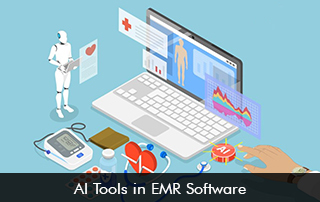Integrating artificial intelligence (AI) solutions in Electronic Medical Records (EMR) Software has become necessary in modern healthcare. Many tedious tasks such as billing, clinical, and administrative processes can be automated with the power of different AI tools embedded in EHR Software Systems.
Emerging Artificial Intelligence Technologies
To enhance and boost innovation in EMR Systems the following AI solutions are evolving to improve patient care, and safety levels, and revolutionize the provider’s decision-making process.
- Generative AI
- Natural Language Processing (NLP)
- Deep Learning
- Machine Learning
- Predictive Analysis
EMR Software Vendors Offering AI Tools
Athenahealth EHR Software
Athenahealth EMR Software, a prominent health IT has teamed up with Nuance to provide AI-powered speech recognition for clinical documentation. Recently, they released generative AI technologies that automate insurance selection.
Epic EMR Software
It is no surprise that Epic EHR Software is on the list of AI innovations in healthcare. With the help of Microsoft’s Azure OpenAI service, Epic EMR Systems has integrated Artificial Intelligence capabilities including natural language searches, making it easier for physicians to engage with data. To assist in creating clinical notes based on patient talks, they have also included AI voice assistants.
eClinicalWorks EMR Software
To streamline and automate clinical documentation, eClinicalWorks Electronic Health Records (EHR) Software has released EVA as their virtual assistant. Patient encounters can now be more meaningful as the provider can give undivided attention to the patient.
PIMSY EHR Software
Open AI was integrated into the PIMSY EMR Software for mental health to help doctors with not summarization.
MEDITECH EMR Software
Electronic Medical Records Software vendor, MEDITECH has joined hands with Google on a generative AI project. The aim is to simplify clinical documentation so clinicians have more to focus on patient care and improve satisfaction scores.
Benefits of AI in Healthcare
- The use of AI models in software systems can help identify patients at risk of developing certain health conditions. For example, AI models can foresee the likelihood of heart disease taking into account patterns in patient data.
- With Artificial intelligence healthcare organizations can realize operational efficiency as tasks such as scheduling, billing, and documentation are automated. Hence helps to address the grave issue of clinician burnout.
- AI is capable of analyzing enormous volumes of patient data to spot patterns, guide public health regulations, and enhance the planning and distribution of healthcare resources.
- Human error can be reduced with Artificial Intelligence and ensures evidence-based decision-making by offering data-driven insights to physicians.
- EMR Software incorporated with AI solutions can help providers with image recognition. Diagnostic accuracy improves with AI-driven image recognition capabilities.








